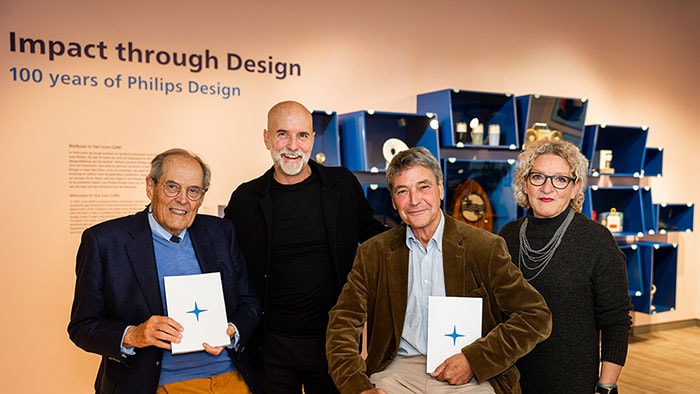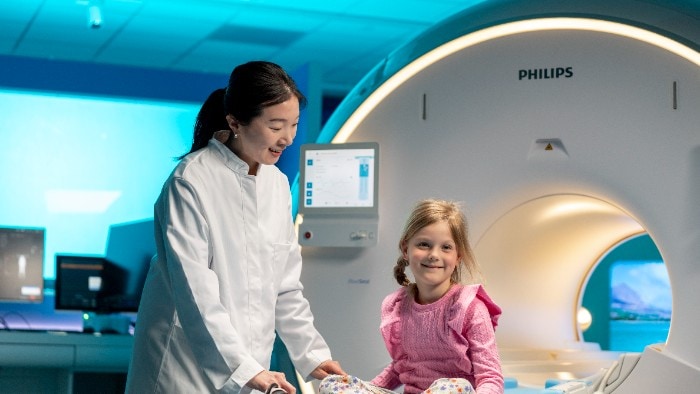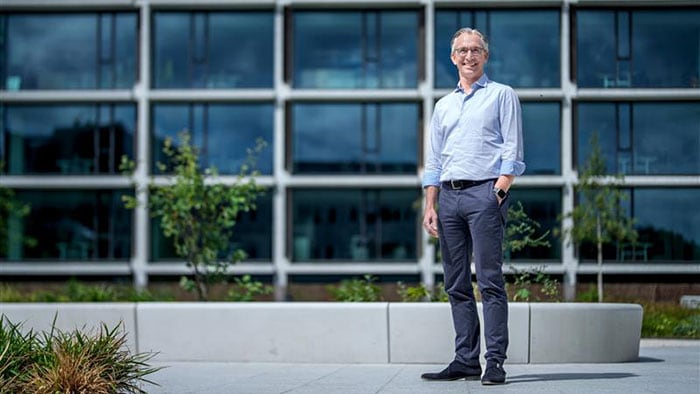Meer betrokkenheid van patiënten, betere ondersteuning van artsen en gestroomlijnde administratieve werkzaamheden. Shez Partovi, Chief Innovation & Strategy Officer bij Philips, ging tijdens zijn toespraak op TheNextWeb Conference 2023 (TNW) in op drie cruciale toepassingen van generatieve kunstmatige intelligentie (artificial intelligence, AI). Hij legde de nadruk op de voordelen die elk van deze toepassingen biedt voor patiënten, artsen en zorgpersoneel. Partovi: “Er is een overvloed aan data, maar een armoede aan inzichten. AI kan voor iedereen voordelen bieden op dit gebied.”
De gezondheidszorg zit wereldwijd in een lastig parket. Denk daarbij aan personeelstekorten, een groeiende hoeveelheid aan data en beperkte toegang tot zorg. Er is dringend behoefte aan innovatieve oplossingen om deze uitdagingen aan te pakken en te verbeteren. Een deel van de oplossing zit volgens Partovi in generatieve AI. Hij sprak in een panel over de potentie van AI in healthcare tijdens TNW, het tweedaagse technologie-evenement waar technologieleiders en -liefhebbers samenkomen om te onderzoeken hoe technologie de wereld van morgen vormgeeft.
Een belangrijk onderwerp tijdens deze conferentie betrof generatieve kunstmatige intelligentie. Dit is een vorm van AI waarmee iemand teksten, afbeeldingen of andere content kan genereren door een opdracht te geven aan een AI-model. Dit model interpreteert de opdracht, baseert zich op een zeer uitgebreide dataset en geeft vervolgens een resultaat. Steeds meer bedrijven, onderwijsinstellingen en zoekmachines in veel verschillende sectoren maken gebruik van deze slimme online hulpjes.
Ook de gezondheidszorg kan profiteren van deze ontwikkelen, vindt Partovi. Door waardevolle inzichten te halen uit enorme hoeveelheden gegevens kan het een revolutie veroorzaken in de gezondheidszorg wereldwijd.
De voortekenen voor het omarmen van deze technologie zijn gunstig. Uit de Future Health Index 2023 van Philips blijkt dat 83 procent van leiders in de gezondheidszorg van plan is te investeren in AI, ten opzichte van 74 procent in 2021. Daarnaast wordt AI al toegepast in de gezondheidszorg bij het plannen van patiënten, het toewijzen van personeel en het plannen van klinische taken. En omdat het zorglandschap moment wat uitdagingen kent, stelt Partovi dat deze toepassingen een vitale rol blijven spelen in het verbeteren van de efficiëntie in de zorg.
Generatieve AI heeft volgens Partovi voordelen op drie belangrijke terreinen:
1. Meer betrokkenheid van patiënten
Generatieve AI heeft de potentie om complexe informatie te distilleren in eenvoudig te begrijpen informatie. Dit vergroot de betrokkenheid van patiënten en hun familie, omdat ze de situatie beter kunnen begrijpen en zo beter deelnemen aan het gezondheidstraject. Ze kunnen zich beter (laten) informeren en daardoor betere beslissingen nemen.
"Generatieve AI heeft de potentie om patiënten met hun medische dossiers te laten 'praten', vragen te stellen en te worden voorgelicht over hun eigen gezondheidsstatus," deelde Partovi met het publiek op TNW.
2. Betere ondersteuning van artsen
Artsen streven naar kwalitatief hoogwaardige zorg, maar kunnen moeite hebben om alle beschikbare data uit verschillende bronnen met elkaar te combineren. Generatieve AI biedt een oplossing in de vorm van geavanceerde tools die complexe gegevens kunnen omzetten in bruikbare inzichten. Door samenvattingen, op AI gebaseerde voorspellingen en intuïtieve visualisaties te bieden, kunnen ze clinici helpen efficiënt en snel geïnformeerde beslissingen te nemen.
Door voorspellende analysemogelijkheden te combineren met gegevens uit andere bronnen, zoals het medisch dossier, kan generatieve AI nog nauwkeuriger zijn en betere klinische voorspellingen doen, zodat artsen eerder kunnen ingrijpen. Eén ziekenhuis gebruikt al op AI gebaseerde voorspellingstechnologie om het aantal hartstilstanden op de IC met meer dan 86 procent te verminderen. Voorspellende analyses worden ook gebruikt om mensen te identificeren die een risico lopen op levensbedreigende hartritmestoornissen.
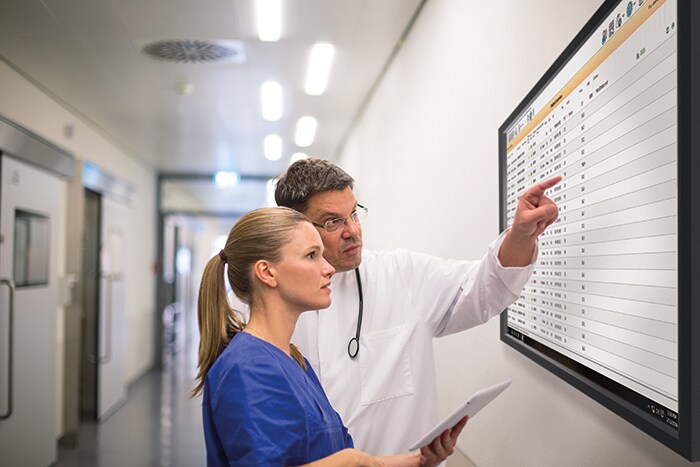
“De impact van innovatie is altijd moeilijk voor te stellen, maar de mogelijkheden beperken zich niet alleen tot tekstbronnen”, stelde Partovi. “In de toekomst zou een patholoog kunnen praten met een digitale pathologie-scan door bijvoorbeeld de generatieve AI te vragen naar aanwezigheid van specifieke cellen.” Volgens Partovi realiseren we nog niet welke kwantumsprong voor ons ligt in de gezondheidszorg, dankzij de potentie van generatieve AI.
3. Administratieve activiteiten stroomlijnen
De klinische voordelen van generatieve AI krijgen terecht veel aandacht, maar het potentieel voor het optimaliseren van operationele en administratieve taken mag niet worden vergeten. De gezondheidszorg streeft immers continu naar kostenbesparing en efficiëntie. Generatieve AI kan dan een krachtige bondgenoot zijn. Denk daarbij aan het voorspellen van patiëntaantallen op spoedeisende hulp en de bijbehorende personeelsbehoefte. Generatieve AI kan daarnaast helpen workflows te optimaliseren, zodat werknemers efficiënter kunnen werken. Dat leidt weer tot hogere productiviteit en betere patiëntresultaten.
Deze drie voordelen lijken duidelijk, maar het implementeren van generatieve AI in de gezondheidszorg is niet zonder uitdagingen. Er moet een balans gevonden worden tussen regelgeving en innovatie. Door begeleiding, ondersteuning en grenzen te bieden, moet regelgeving de verantwoorde ontwikkeling en toepassing van AI-technologie vereenvoudigen.
Generatieve AI heeft een enorm potentieel om de gezondheidszorg op meerdere vlakken te ondersteunen. Patiënten worden actieve deelnemers aan hun zorgtraject en artsen krijgen toegang tot waardevolle inzichten voor beter geïnformeerde besluitvorming. Bovendien zal de integratie van generatieve AI in administratieve processen workflows stroomlijnen, diagnostische mogelijkheden verbeteren en de toewijzing van middelen optimaliseren, wat leidt tot betere resultaten voor de patiënt, lagere kosten en meer efficiëntie. Door samen te werken wil Philips de kracht van AI inzetten om de gezondheidszorg te ondersteunen en uiteindelijk levens te verbeteren.
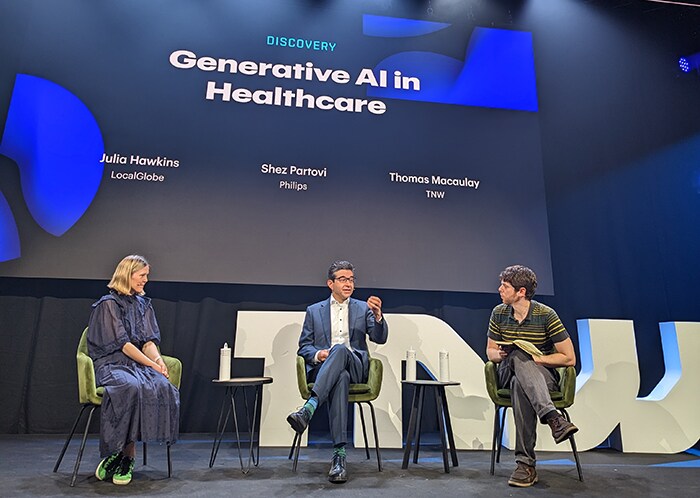
Harnessing the potential of generative AI in healthcare: a quantum leap for patients, clinicians, and administrators
In an era marked by global healthcare challenges, such as staff shortages, data overload, workflow inefficiency and limited access to care, the need for innovative solutions has never been greater. Generative AI is emerging as a technology offering transformative opportunities across society, including in the delivery of efficient and effective healthcare. By extracting valuable insights from vast amounts of data, it could have the potential to revolutionize healthcare systems worldwide. Speaking at The Next Web 2023, Philips’ Chief Innovation & Strategy Officer Shez Partovi touched on three pivotal applications of generative AI, focusing on the benefits each of them offers to patients, clinicians, and hospital administrators.
Following explosive growth in recent years, AI continues to be a key area of future investment for healthcare leaders. Philips’ Future Health Index 2023 revealed that 83% of healthcare leaders are planning to invest in AI in the next three years, up from 74% in 2021. Applications already being deployed range from automated document generation to AI that can help schedule patients, allocate staff resources, and schedule clinical tasks. In a healthcare landscape currently suffering from acute staff shortages and financial constraints, these applications will continue to play a vital role in enabling more efficient use of resources according to Shez.
Engaging patients – While AI is already helping allocate resources more efficiently, generative AI is a potential game-changer of even greater magnitude. With diagnosis and treatment becoming ever more complex and patient-specific, generative AI has the potential to distill complex information into easily understandable formats, empowering patients, their families and consumers to more actively participate in their healthcare journey. By bridging the health literacy gap, it promises to facilitate informed decision-making, leading to improved health outcomes and a more engaged patient population. “Generative AI has the potential to allow patients to “talk to” their medical charts, ask questions, and be educated on their own health status,” Shez shared with the audience at The Next Web.
Empowering clinicians – Clinicians are at the forefront of delivering quality care but often struggle to make the most of the available data due to its disconnected nature and volume. Generative AI offers a solution in the form of advanced tools that can convert complex data into actionable insights. By providing summaries, AI-based predictions, and intuitive visualizations, it can help clinicians make informed decisions efficiently and quickly. Generative AI offers us a glimpse of how AI can have a significant positive impact on nursing workflow. Current bedside monitoring devices deliver real-time data on current patient vital signs. With generative AI, bedside monitors could also display the probability of patient instability in the future, helping nursing staff anticipate and act sooner to improve patient care. Moreover, by combining this predictive analytics capability with data from other sources such as the patient’s medical record, generative AI could be even more accurate and provide robust clinical prediction so clinicians can intervene and prevent poor outcomes. One hospital is already using AI-based prediction technology to reduce the number of cardiac arrests by more than 86% in the ICU [1]. Predictive analytics are also being used to help identify individuals at risk of life-threatening heart rhythm disorders.

Shez: “The level of innovation is sometimes hard to imagine and is not limited to text-based data sources. In the future, a pathologist could “talk to” the digital pathology slide: “Are there any small blue cells?” could be a question, and the generative AI would then pan to the part of the slide where Lymphoma cells may be found. We really have not yet realized the quantum leap ahead of us in healthcare, thanks to the potential of generative AI.” [1] Subbe, C.P., Duller, B. & Bellomo, R. Crit Care (2017) 21: 52. doi:10.1186/s13054-017-1635-z
Streamlining administrative operations – While the clinical aspects of generative AI have garnered significant attention, its potential for optimizing operational and administrative functions should not be overlooked. In an era where healthcare systems strive for cost savings and efficient resource allocation, generative AI is emerging as a powerful ally. Through operational forecasting, for example, it can predict patient volumes in emergency departments and forecast staffing requirements. By optimizing workflows and reducing inefficiencies, generative AI will help healthcare organizations operate more effectively, resulting in enhanced productivity and improved patient outcomes.
Philips HealthSuite Imaging on AWS, a new addition to Philips’ broad capabilities in enterprise informatics, enables improved image access speeds, reliability, and data orchestration for radiologists and clinicians across the entire imaging workflow – from diagnosis to therapy selection, treatment, and follow-up. It also allows clinicians to access the latest AI-driven innovations from anywhere, and healthcare organizations to reduce costs previously invested in on-premise data centers.
Overcoming challenges and embracing innovation – Implementing generative AI in healthcare is not without its challenges. Regulatory considerations and clinician acceptance are critical factors influencing successful adoption. Striking the right balance between regulation and innovation is key to ensuring progress. By providing guidance, support, and boundaries, regulations should facilitate the responsible development and deployment of AI technology. Fostering a values-based approach to innovation, one that considers ethical and societal implications, will build trust and ensure it is used responsibly.
Generative AI holds tremendous potential to support healthcare across multiple dimensions. Patients will become active participants in their healthcare journey and clinicians will gain access to valuable insights for better informed decision-making. Moreover, the integration of generative AI in administrative operations will streamline workflows, enhance diagnostic capabilities, and optimize resource allocation, leading to improved patient outcomes, reduced costs, and increased efficiency. Through collaboration, Philips aims to harness the power of AI to support healthcare delivery, ultimately improving lives.


